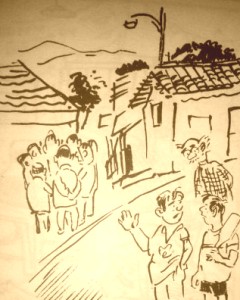

One of the sharpest political satirist & cartoonist, India has ever seen...
![A self caricature by R. K. Laxman with his common man. [Source: https://en.wikipedia.org/wiki/File:Laxman_with_common_man.jpg]](./images/blog/post4/1_tmb.jpg)
For over half a century, R.K. Laxman - India's best-loved cartoonist - and his famous character, 'The Common Man', stood as a symbol of hope - or rather as a single perfumed rose - on the front pages of 'The Times of India' brimming with the thorns of bad news, mostly from the uproariously ludicrous political scenario of the country.
Among an avalanche of daily news items related to the political buffoonery, gross corruption, human rights violation and all the pompous drama played in the name of democracy, a single column box of a cartoon titled 'You Said it', sketched in black inking by one of the sharpest political satirist & cartoonist India has ever seen stood out as a peephole for those who wanted to 'see' the reality and harshness of the routine socio-political scene that unfolded around him.
'The common man casts his vote' in the 'Best of Laxman' series published by Penguin is an excellent project which collects some of the finest of his cartoon strips featuring his tired and mute 'common man'.
While India has a deep and rich heritage in almost all forms of arts, 'the art of cartooning' was something that it adapted from the British in the late 1800s. In the beginning it was used as a medium for conveying concerns about social issues like dowry and child marriage. Indian Cartoonists soon identified the power of caricature illustrations for spreading political awareness and political messages against the colonial rule.
After gaining independence, the socio-political scenario of the country was a thriving ground for political cartoonists. From the words of R.K. Laxman himself we can find the reason behind the post-independent India providing an aspirant political cartoonist with enough inspiration for an exciting career. After musing about the formation of a constitution, which promised peace & prosperity along with freedom and equality among its people, he observes:
"If things had worked the way our founding fathers had hoped, the cartoonist would have become an extinct species long ago... But fortunately for the cartoonist, both the rulers and the ruled unintentionally became champions of the cartoonist's cause & ceaselessly provided grist to his mill...
Our political activities became equally uproarious from a satirist's point of view... Naturally, a cartoonist, even one with limited talent, could flourish effortlessly in this atmosphere. So within a decade of independence, the tribe of cartoonists proliferated."
The role played by a political cartoonist in a democratic society is explained by R.K. Laxman with these words:
"The funny antics & humorous articles of a court jester were really satirical comments used to gently bring a wayward king and his band of courtiers back on track... The role of today's cartoonist is not unlike that of the court jester of yore. His business in a democracy is to exercise his right to criticize, ridicule, find fault with and demolish the establishment and political leaders, through cartoons and caricatures."
R.K. Laxman, the winner of the Ramon Magsaysay Award of 1984 - Asia's top journalism award - was born in Mysore, South India in 1924. When he started with his single column strip cartoon titled 'You Said it' in 1951, to make his character to be a representative of the whole Indian society he created 'The Common Man', a man in a checked coat with a perpetual bewilderment pasted on his face. 'The Common Man' was the true representative of the average Indian who witnessed and tolerated the atrocities and indignities performed by their political masters with a sense of wry resignation.

The Common Man on the commemorative postage stamp and First Day Cover on The Times of India, issued 3 Nov 1988.
R.K. Laxman made 'The common man' ubiquitous in his cartoon panels; he was witnessing everything, but not taking part in anything, a mute witness who stood as a mirror pointed at the society showing their own reflection loaded with indifference. In one cartoon panel we see 'The common man' silently witnessing a high level political meeting, while in another we meet him among the slums dwellers observing their misery.
R.K. Laxman explains why 'The Common Man' was portrayed as a silent spectator rather than being an active participant in his cartoon panels.
Like the mute people of our country he has not uttered a word in all the years he has been around... often a bemused spectator of events which anyway are beyond his control...

In this compilation volume titled 'The common man casts his vote', we can sample more than 180 of his Common Man cartoon panels, which are pregnant with wisdom and cynical humor. Here we watch through his eyes election campaigns, party meetings, power tussles, scandals and scams, election promises and other drama getting unfolded, which can amuse, infuriate and even make you sad if you observe each panel closely.
A random sample taken from the volume, can give you a glimpse at the gravity and weight of the scenes that The Common Man's weary eye's had to burden themselves with.
R.K. Laxman left us in January 2015, leaving an orphaned 'Common Man' and while going through these political snapshots - many of them already familiar from the early newspapers - in this compilation we were startled by their significance even in the present socio-political scenario; these cartoon panels - as quoted by R.K. Laxman himself - "are timeless in their relevance to any given moment in our history".